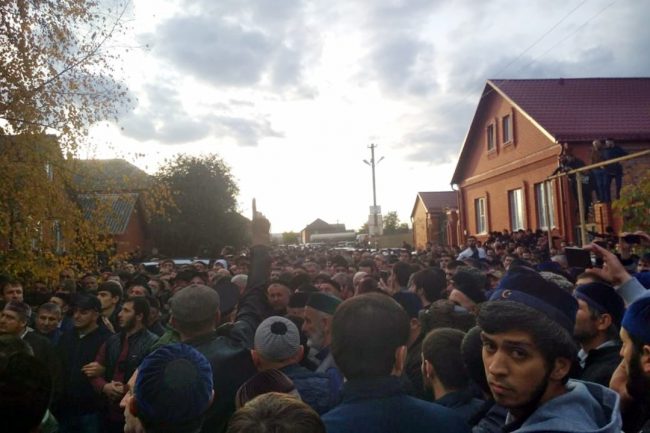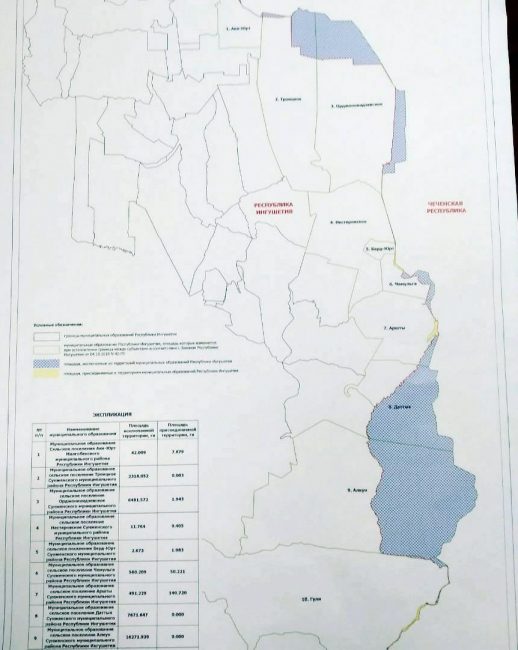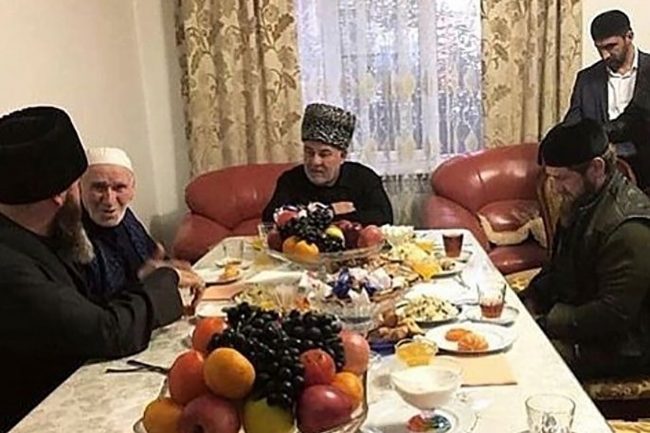

Chechen head Ramzan Kadyrov has paid a number of personal visits to Ingush protest leaders after a land deal between the Russian republics of Chechnya and Ingushetia sparked outrage in Ingushetia.
From 18–26 October, Kadyrov and other senior members of the Chechen government appeared to make peace with leaders of several Ingush teips (clans) after a heated war-of-words between the two sides.
However, prominent Ingush activists continued to insist the land deal with Chechnya was illegitimate.
Mass protests erupted in Magas on 4 October, as Ingushetia’s parliament, the People’s Assembly, approved the controversial border agreement with Chechnya. Several MPs announced that the vote was rigged, while the Ingush Constitutional Court declared the deal unconstitutional and demanded a referendum.
The previously unannounced agreement was signed between the head of Ingushetia, Yunus-Bek Yevkurov, and the head of Chechnya, Ramzan Kadyrov in Magas on 26 September.
On 17 October, protesters left Magas’s central avenue as the permit for holding the protest had expired. However, protesters vowed to continue to fight against the deal.
Official authorisation has been granted for new rallies in Magas from 31 October to 2 November.
[Read more on OC Media: Protests in Ingushetia ‘on pause’]
According to an independent cadastral examination commissioned by Zakri Mamilov, an MP in the Ingush parliament, Ingushetia lost 338 square kilometres to Chechnya in the deal — 9.3% of its territory.

A legal evaluation of the deal commissioned by public organisation the Council of the Ingush People’s Teips concluded that it ‘should be recognised as illegitimate’. The evaluation was conducted by legal expert Marina Rylskaya, a member of the CSTO Parliamentary Assembly’s expert committee.
At an Extraordinary Congress of Representatives of the Ingush People on 27 October, representatives decided that the agreement should be recognised as illegitimate, Yevkurov’s actions should be legally evaluated, and direct elections for the head of the republic should be returned to Ingushetia.
Another gathering was planned for 30 October.
‘Where am I at fault?’
On 19 October, Kadyrov visited Mukhazhir Nalgiyev, an Ingush elder and activist, in his home village of Surkhakhi in Ingushetia’s Nazran District. The delegation included the head of the Chechen Parliament, Magomed Daudov, and reporters from Chechnya’s state TV.
During the protests, Nalgiyev had harshly criticised comments Kadyrov made at a meeting of the Chechen government in which he threatened the Ingush people with violence.
‘This group of people who call themselves leaders, if you are men, come to my territory and make just one rally. If you leave alive, then you can call me’, Kadyrov said at the meeting.
When news of Kadyrov’s arrival spread, several hundred men surrounded a mosque Nalgiyev was in at the time.
One of Nalgiyev’s relatives who wished to remain anonymous told OC Media that Kadyrov claimed he had come to make peace and that the two had reconciled after their meeting.
He said Kadyrov told Nalgiyev he did not want to offend the Ingush people and spoke only about specific protesters.
Kadyrov later performed a night prayer in a local mosque, after which he asked the audience not to shift responsibility for the deal to him.
Kadyrov claimed the agreement was suggested to him by the head of Ingushetia, Yunus-Bek Yevkurov.
He added that as head of Chechnya, he could not be held responsible for the constitution of Ingushetia or its people.
‘Neither by secular laws nor by sharia — I take no decisions for you — then where am I at fault?’, Kadyrov said.
On 20 October, the head of the Chechen Parliament, Magomed Daudov, visited Ingush activist Daut Yandiyev at his home in Ingushetia, after which the two left for Chechnya.
At protests against the land deal, Yandiyev had ‘insulted’ the head of Chechnya and said that he did not believe Chechens and Ingush were fraternal people.
In a conversation with Kadyrov broadcast on Chechen state TV, Yandiyev apologised to the Chechen head and the Chechen people.
‘We are concerned about our land’
On 24 October, Daudov visited the home of mufti of Ingushetia Isa Khamkhoyev, the traditional leader of Ingush Muslims, in the Ingush city of Nazran.
Daudov said he wished to convey that Kadyrov was prepared to resolve the territorial dispute in Sharia court, as Khamkhoyev himself had apparently suggested.
He said he was told Khamkhoyev was not home.
Speaking to the Congress of the Ingush People on 27 October, Khamkhoyev, condemned Daudov’s visit and said that the next time, he could expect a harsh reaction from local young people.
On 24 October, Daudov also visited protest leader Akhmed Barakhoyev, in his home village of Novy Redant, in Ingushetia’s Malgobek District.
Daudov informed him that Kadyrov was summoning him to Chechnya to respond in Sharia court to comments he had made about him.
Barakhoyev had called Kadyrov ‘powerless’ after Kadyrov had threatened his relative, former Ingush Interior Minister Akhmed Pogorov.
Ingush activist Bekkhan Khashagulgov, who was present at the scene, told OC Media that hundreds of people gathered in the village to support Barakhoyev.
After Daudov’s departure, Barakhoyev spoke to the crowd saying he had told Daudov he would not take back his words about Kadyrov. He said he had agreed to meet Kadyrov in Sharia Court but not in Chechnya.
On October 26, a delegation from Chechnya headed by Kadyrov came to meet Pogorov.
Activist Bekkhan Khashagulgov told OC Media that this time ‘several thousand’ Ingush people from all over the republic came Pogorov’s house to support him.

After the departure of the Chechen delegation, Barakhoyev, who was at the meeting, told the crowd gathered outside that the two sides had reconciled.
He said that he and Pogorov’s family had repeated their basic demands to their guests from Chechnya.
‘[Ramzan Kadyrov] said that he knows that our goal is to make [Ingush head Yunus-Bek Yevkurov] resign. I swore to the Almighty that we initially had no intention to demand the resignation of Yevkurov, we are concerned about our land, and we will be diligent in defending our territory’, said Barakhoyev.
Magomed Mutsolgov, the head of Ingush rights group Mashr, told OC Media that people coming to the houses of activists during the visits from Chechen officials showed the Chechen authorities that the Ingush activists have ‘the support of people’.
‘People come to prevent psychological pressure on our social activists.’
He said the war of words between Ingush activists and the Chechen leadership had now been settled.






